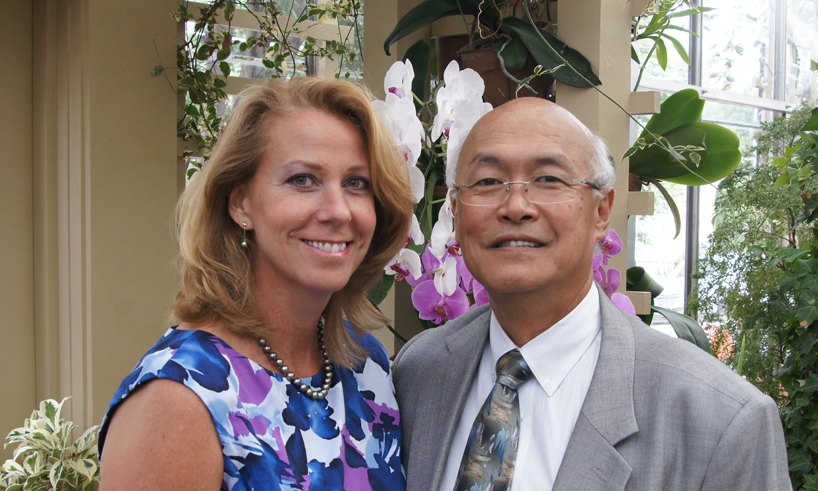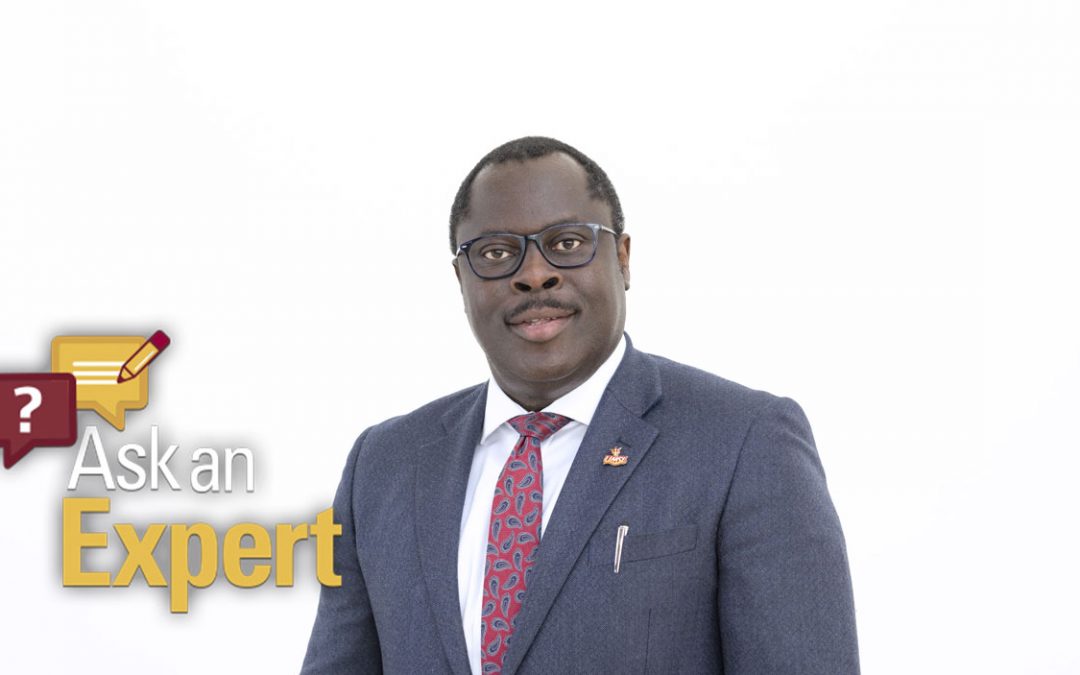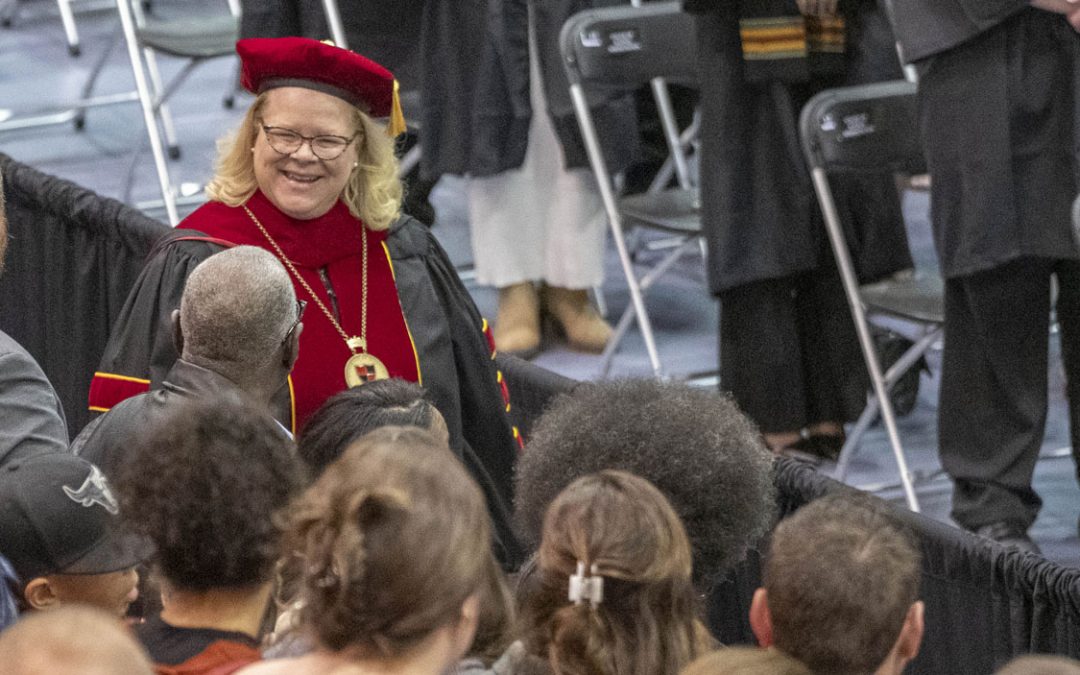
Chemistry PhD graduates Dawn and Bill Shiang successfully managed dual careers during 25 years working and climbing the corporate ladder at Dow Chemical. They believe their experience has lessons for couples starting their careers today. (Photo courtesy of Bill Shiang)
Bill Shiang is still covering upward of 75,000 miles a year on flights back and forth to Europe or China as he works as a consultant in the chemical industry.
His wife, Dawn, spends four days a week trekking – an hour each way – from their “hobby” farm near the tiny town of Birch Tree, Missouri, to West Plains, where she volunteers as an interim executive director in the office of the 37th Judicial Circuit’s Court Appointed Special Advocates.
But life has slowed down enough for the two University of Missouri–St. Louis alumni, three years after they retired from Dow Chemical, that they’ve been able to reflect on how they so successfully managed their dual ascents up the corporate ladder throughout their 25 years with the company.
Theirs is a story of some fortunate circumstances, to be sure, but Shiang doesn’t think that was the only thing helping to make it happen. He believes there are lessons others couples can use – even today – to help them balance their dual careers.
“I have to say we were blessed,” said Bill, who received a UMSL Distinguished Alumni Award in 2014, joining Dawn, who received the honor in 2001. “We were very lucky and fortunate that there was no difficulty in finding something for us to do. But if you bring value to a company – and I’m very convinced even with other companies – they will find ways to help keep both of you happy.”
Of course, even Shiang didn’t begin his career believing what happened would be possible.
Shiang, who was already in his late 20s when he decided to return to school at St. Louis Community College–Florissant Valley while still working in his family’s Chinese restaurants, transferred to UMSL and met Dawn at the campus bookstore while still an undergraduate. They both studied chemistry and started dating, eventually getting married before completing their bachelor’s degrees.
Both went on to earn PhDs in organic chemistry, him under the supervision of Professor Rudi Winter and her working with Professor Robert Murray.
After postdoctoral years at The Pennsylvania State University from 1988-1990, they both hit the job market, unsure of what the future had in store for them.
They felt fortunate to both get offered jobs at Monsanto and had planned to take them until Dow Chemical called wanting to bring them in for interviews.
“We truly liked the way Dow treated their employees as well as their global environmental stewardship – that kind of sealed it for us,” Bill said of what went into the decision to move to Midland, Michigan.
Their time at UMSL prepared them for success in the lab at Dow. He, for one, was awarded more than 20 patents, most in his first five years with the company after starting out in corporate research and development.
Dawn, whose career began working in the company’s agricultural products division, generated five patents in four years, but she was identified for the management ladder and moved into other roles, eventually reaching global research director.
Bill also transitioned out of the lab and into management, retiring as a global supply team and external manufacturing leader.
“We never said no to an opportunity because we believed every opportunity gives you a chance to learn – every promotion and offer provides a chance to expand your skills and add to your experience,” he said.
Dawn was offered the chance to move to spend two years working in Dow’s offices in Switzerland, beginning in 2004, and she brought her family with her.
Bill, then, had to find meaningful work while there, but the company was not lacking opportunities. He began his journey into external manufacturing as well as the start of his developing expertise in China.
When their time in Switzerland was up, he took a position in China developing the company’s plans for external manufacturing there, and Dawn followed him, this time finding her own position as R&D director and helped build the Asian center for Dow’s Corporate Research labs.
“We looked at our marriage as a partnership, and we always discussed opportunities,” he said. “We compromised. For example, when our boys were little, we couldn’t both take positions that required a lot of travel.
“Couples need to discuss and put everything on the table and make sure you’re clear on how to help each other.”
The St. Louis Section of the American Chemical Society’s Women Chemists Committee held an event at UMSL last November on the topic of how to deal with the so-called two-body problem, i.e. how to manage careers when both members of a couple have high qualifications and seek appropriate professional opportunities. It is especially common in academia. The Shiangs spoke at the event and shared their experiences.
Bill understands it might not be as easy today as it was 25 years ago. People entering the workforce now are much less likely to remain with one company and, in fact, can be expected to work for six or seven before their careers end.
That doesn’t mean juggling two careers can’t be done.
He also stresses that for anyone – married or not – it’s important to find work that makes them happy.
“It is more important to find something that you enjoy doing rather than signing up for a position that you think will get you more money or a promotion,” Shiang said. “I followed that mantra or that rule all the time, and because I have so much fun in my work, I got promoted many times. I strongly believe if you’re happy, your productivity is much better.”














